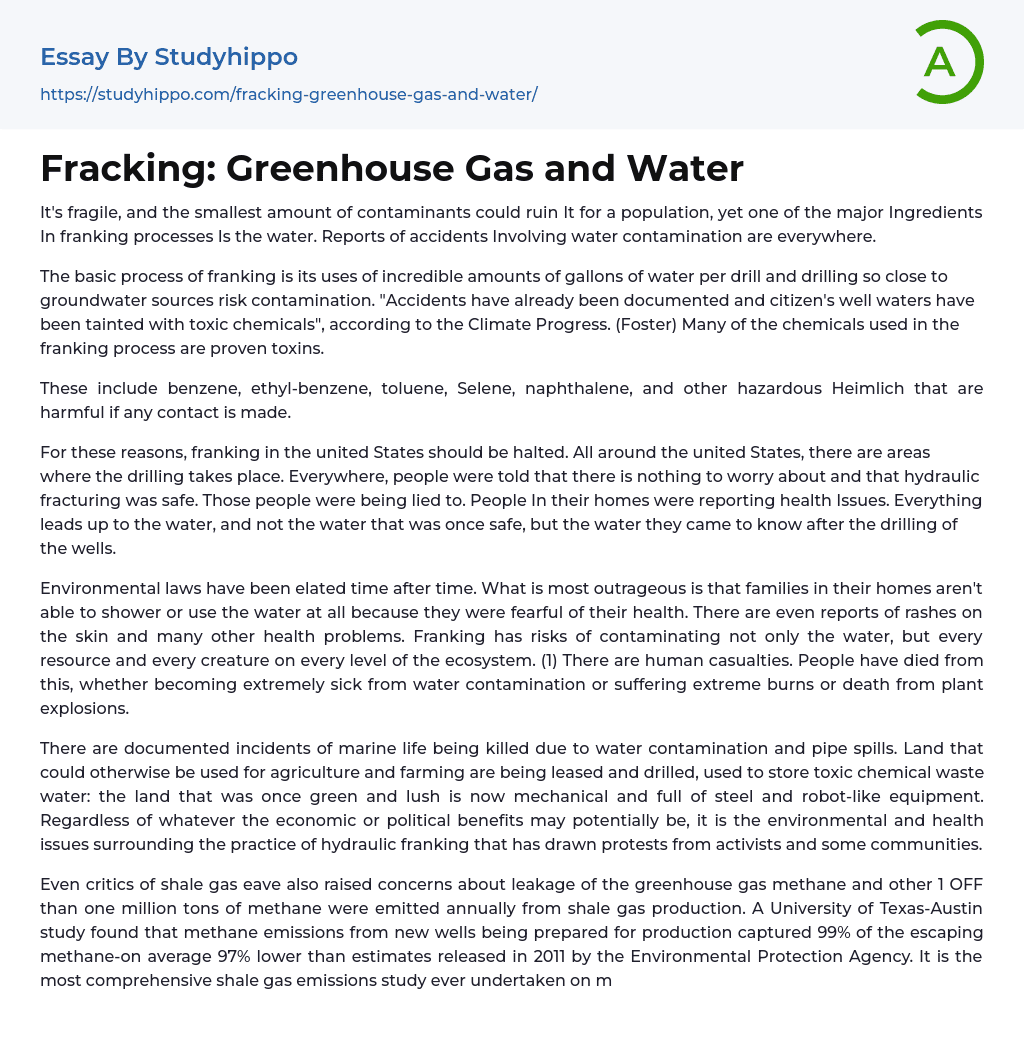Water, despite its fragility and susceptibility to contamination, is a crucial component in franking processes that poses significant risks to the population. The extraction method involves drilling close to groundwater sources and using large amounts of water per drill, resulting in numerous reports of accidents caused by water contamination. The Climate Progress (Foster) has documented incidents where citizens' well waters have been tainted with toxic chemicals due to franking activities utilizing proven toxins like benzene, ethyl-benzene, toluene, Selene, naphthalene and other hazardous chemicals harmful upon contact. Therefore, halting franking in the United States is necessary to prevent further health risks for citizens living near drilling sites. Despite claims of safety from drilling companies, areas around the US where drilling takes place have affected people's health as families cannot use their water for fear of contamin
...ation after franking activities due to weak environmental laws. These practices are outrageous and need immediate cessation. Health problems such as skin rashes have been associated with hydraulic fracking while the practice's risks extend beyond water contamination affecting all resources and creatures in the ecosystem leading to human casualties resulting from severe sickness or even death due to plant explosions or other incidents.
Water pollution and pipe spills have harmed marine life, while toxic chemical waste water is being stored on once-lush agricultural land. The environmentally and health damaging effects of hydraulic fracking, such as methane gas leaks, have sparked activism and community protests. Despite potential economic benefits, critics highlight the release of over one million tons of methane annually from shale gas production. However, a recent study showed that capturing escaping methane could reduce emissions by up to 97%. Th
most comprehensive shale gas emissions study explored methane leakage in 190 well pads across the US and found that if released directly into the atmosphere, methane can cause greater climate change than carbon dioxide. Gas companies refuse to take responsibility for their actions but continue to benefit from job creation and perceived economic advantages. While some individuals may not be aware or concerned about water contamination risks, others are fighting for water purity and future sustainability amidst harmful fracking effects.Despite the supposed environmental benefits of hydraulic fracturing, there is cause for alarm due to possible groundwater contamination caused by the release of methane during extraction. Pound for pound, methane has 105 times more warming impact than carbon dioxide, making even small quantities significant in terms of climate change. The amount of methane leaked during fracking remains a contentious issue. While some argue that hydraulic fracturing can stimulate economic growth and create jobs, it could ultimately prove detrimental to both short-term and long-term economies. Additionally, few industry workers will come from local areas, resulting in limited employment opportunities. Furthermore, farmers may experience decreased business as consumers become concerned about contamination from carcinogens and radioactivity. Industrial pollutants also pose a threat to the tourism sector as visitors seek clean air and relaxation. Ultimately, any job creation will be temporary as resources are depleted over time.Although some environmentalists support natural gas as a transitional fuel to replace dirtier options and reduce CO emissions, it remains a fossil fuel emitting greenhouse gases. Rather than investing in gas infrastructure, energy companies should focus on developing renewable energy sources due to the harmful effects of fracking on groundwater pollution and earthquakes.
It is more economically and environmentally beneficial to produce green energy over fossil fuels. Additionally, oil and gas producers can adopt improved water-treatment options at fracking sites instead of transporting them for disposal or treatment elsewhere. Disposing waste water through underground injection reduces the risk of releasing contaminants in waste water according to the Pacific Institute. Fracking is an unnecessary and dangerous activity that benefits only oil industry executives; investment should be made into creating a hydrogen-based energy economy that is renewable, scalable, and inexpensive with proper safeguards in place. Despite extreme measures taken to prevent harmful outcomes from actions such as fracking, their impact on humans' environment cannot be ignored affecting both current and future generations including various ecosystems.In addition, it gives power to self-centered groups who are not responsible for any potential negative consequences.
- Cleaning essays
- Animal Welfare essays
- Climate Change essays
- Conservation essays
- Global Warming essays
- Plastic essays
- Recycling essays
- Waste Management essays
- Zoo essays
- Adaptation essays
- Adventure essays
- Adversity essays
- Aging essays
- Alcohol essays
- Barbie Doll essays
- Beauty essays
- Care essays
- Carpe diem essays
- Change essays
- Chess essays
- Chicken essays
- Choices essays
- Contrast essays
- Crops essays
- Development essays
- Dream essays
- Evil essays
- Experience essays
- Family essays
- Farm essays
- Fire essays
- First Love essays
- Focus essays
- Greed essays
- Hero essays
- Holiday essays
- House essays
- Housing essays
- Humility essays
- Humor essays
- Hypocrisy essays
- Integrity essays
- Law of Life essays
- Life Changing Experience essays
- Life Experience essays
- Lifestyle essays
- Limitations essays
- Love Story essays
- Mother Tongue essays
- Motherhood essays




